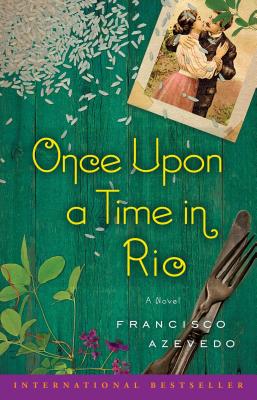From well-known Brazilian playwright Francisco Azevedo, a heartwarming debut novel about three generations of a family whose kitchen contains the secret ingredient for happiness--sure to appeal to fans of Like Water for Chocolate.
"Once upon a time there was some rice. Rice planted in the earth, fallen from the sky, and gathered up from the stone. Rice that doesn't spoil, it came from far away, by ship with three exuberant young people filled with dreams..."
Once Upon a Time in Rio is a spellbinding family saga beginning with Jose Custodio and Maria Romana and their search for a prosperous future. As newlyweds, Jose and Maria immigrated to Brazil at the beginning of the twentieth century, accompanied by a special gift. During the dinner preparations to celebrate their centenary wedding anniversary, their eldest son Antonio, already a grandfather, looks back at the lives of his parents, his aunt, his brothers, their children and grandchildren, as well as his own.
Antonio knows that family is a difficult dish to get right and that happiness must be cooked up day by day; however, what separates his family from any other is its possession of a secret ingredient for happiness: the sack of magical rice given to his parents on their wedding day. With the help of the rice, whose magic is as old as fire and time, Antonio's family has been guided through the most trying of life's tribulations.
Lyrically written, Once Upon a Time in Rio bares the fragile yet strong nature of the human spirit and with great insight captures the solace provided by loved ones in times of need. Already an international bestseller, this is a beautifully told tale about the wisdom of past generations and the inextricable ties of family.
A highly charged, sultry, beautifully written and compulsive one-sit read, The Lemon Grove is an intense novel about obsession and sex—the perfect summer book.
Jenn and Greg have been married for fourteen years, and, as the book opens, they are enjoying the last week of their annual summer holiday in Deia, a village in Majorca off the coast of southern Spain. Their days are languorous, the time passing by in a haze of rioja-soaked lunches, hours at the beach, and lazy afternoon sex in their beautiful villa. It is the perfect summer idyll . . . until Greg's teenage daughter (Jenn's stepdaughter), Emma, arrives with her new boyfriend, Nathan, in tow.
What follows, over the course of seven days, is a brilliantly paced fever dream of attraction between Jenn and the reckless yet mesmerizing Nathan. It is an intense pas de deux of push and pull, risk and consequence . . . and moral rectitude, as it gets harder and harder for Jenn to stifle her compulsion.
This is a very smart novel about many things: the loss of youth, female sexuality, the lure of May/December temptation, the vicissitudes of marriage and the politics of other people's children. It is simultaneously sexy and substantive, and Helen Walsh's masterful, even-handed tone can't help but force the reader to wonder: "What would I have done?"
Beautifully written with the tension of a rubber band just about to snap, The Lemon Grove is a book that will have people talking all summer long.
In this riveting new novel from Michael Hiebert, a killer's release is the catalyst for shocking revelations in a small Southern town. . .
At twenty-two, Sylvie Carson has known a lifetime's worth of trouble. When she was a child, her baby brother was shot to death by a man named Preacher Eli. Orphaned by her teens, Sylvie is now raising her own baby with no partner in sight. For all these reasons, Leah Teal, Alvin, Alabama's only detective, tries to stay patient when Sylvie calls the station day and night, always with some new false alarm. But now Preacher Eli is out of prison and moving back to town.
As far as the law is concerned, the old man has paid his dues--though Leah's twelve-year-old son, Abe, vehemently disagrees. Between that and his relentless curiosity about the daddy he hardly knew, Abe's imagination is running in all directions lately. While Leah struggles with how much of the past to reveal to Abe, she's also concerned about Sylvie's mounting panic. Something in her gut tells her the girl might be a target after all. For as Leah knows well, there's danger not just in the secrets others keep from us, but in the lies that corrupt from within. It's a hunch that will be tested soon enough, as tensions mount on both sides.
Evoking the South with depth and grace, Michael Hiebert's poignant, gripping novel captures the strength wrought by heartache and lost innocence--and the transformative power of forgiveness, whenever it comes. . .
"Once upon a time there was some rice. Rice planted in the earth, fallen from the sky, and gathered up from the stone. Rice that doesn't spoil, it came from far away, by ship with three exuberant young people filled with dreams..."
Once Upon a Time in Rio is a spellbinding family saga beginning with Jose Custodio and Maria Romana and their search for a prosperous future. As newlyweds, Jose and Maria immigrated to Brazil at the beginning of the twentieth century, accompanied by a special gift. During the dinner preparations to celebrate their centenary wedding anniversary, their eldest son Antonio, already a grandfather, looks back at the lives of his parents, his aunt, his brothers, their children and grandchildren, as well as his own.
Antonio knows that family is a difficult dish to get right and that happiness must be cooked up day by day; however, what separates his family from any other is its possession of a secret ingredient for happiness: the sack of magical rice given to his parents on their wedding day. With the help of the rice, whose magic is as old as fire and time, Antonio's family has been guided through the most trying of life's tribulations.
Lyrically written, Once Upon a Time in Rio bares the fragile yet strong nature of the human spirit and with great insight captures the solace provided by loved ones in times of need. Already an international bestseller, this is a beautifully told tale about the wisdom of past generations and the inextricable ties of family.
A highly charged, sultry, beautifully written and compulsive one-sit read, The Lemon Grove is an intense novel about obsession and sex—the perfect summer book.
Jenn and Greg have been married for fourteen years, and, as the book opens, they are enjoying the last week of their annual summer holiday in Deia, a village in Majorca off the coast of southern Spain. Their days are languorous, the time passing by in a haze of rioja-soaked lunches, hours at the beach, and lazy afternoon sex in their beautiful villa. It is the perfect summer idyll . . . until Greg's teenage daughter (Jenn's stepdaughter), Emma, arrives with her new boyfriend, Nathan, in tow.
What follows, over the course of seven days, is a brilliantly paced fever dream of attraction between Jenn and the reckless yet mesmerizing Nathan. It is an intense pas de deux of push and pull, risk and consequence . . . and moral rectitude, as it gets harder and harder for Jenn to stifle her compulsion.
This is a very smart novel about many things: the loss of youth, female sexuality, the lure of May/December temptation, the vicissitudes of marriage and the politics of other people's children. It is simultaneously sexy and substantive, and Helen Walsh's masterful, even-handed tone can't help but force the reader to wonder: "What would I have done?"
Beautifully written with the tension of a rubber band just about to snap, The Lemon Grove is a book that will have people talking all summer long.
In this riveting new novel from Michael Hiebert, a killer's release is the catalyst for shocking revelations in a small Southern town. . .
At twenty-two, Sylvie Carson has known a lifetime's worth of trouble. When she was a child, her baby brother was shot to death by a man named Preacher Eli. Orphaned by her teens, Sylvie is now raising her own baby with no partner in sight. For all these reasons, Leah Teal, Alvin, Alabama's only detective, tries to stay patient when Sylvie calls the station day and night, always with some new false alarm. But now Preacher Eli is out of prison and moving back to town.
As far as the law is concerned, the old man has paid his dues--though Leah's twelve-year-old son, Abe, vehemently disagrees. Between that and his relentless curiosity about the daddy he hardly knew, Abe's imagination is running in all directions lately. While Leah struggles with how much of the past to reveal to Abe, she's also concerned about Sylvie's mounting panic. Something in her gut tells her the girl might be a target after all. For as Leah knows well, there's danger not just in the secrets others keep from us, but in the lies that corrupt from within. It's a hunch that will be tested soon enough, as tensions mount on both sides.
Evoking the South with depth and grace, Michael Hiebert's poignant, gripping novel captures the strength wrought by heartache and lost innocence--and the transformative power of forgiveness, whenever it comes. . .
From the best-selling author of While I Was Gone and The Senator’s Wife, a superb new novel about a family and a community tested when an arsonist begins setting fire to the homes of the summer people in a small New England town.
Troubled by the feeling that she belongs nowhere after working in East Africa for 15 years, Frankie Rowley has come home—home to the small New Hampshire town of Pomeroy and the farmhouse where her family has always summered. On her first night back, a house up the road burns to the ground. Is it an accident, or arson? Over the weeks that follow, as Frankie comes to recognize her father’s slow failing and her mother’s desperation, another house burns, and then another, always the homes of summer people.
Troubled by the feeling that she belongs nowhere after working in East Africa for 15 years, Frankie Rowley has come home—home to the small New Hampshire town of Pomeroy and the farmhouse where her family has always summered. On her first night back, a house up the road burns to the ground. Is it an accident, or arson? Over the weeks that follow, as Frankie comes to recognize her father’s slow failing and her mother’s desperation, another house burns, and then another, always the homes of summer people.
These frightening events, and the deep social fault lines that open in the town as a result, are observed and reported on by Bud Jacobs, a former political journalist, who has bought the local paper and moved to Pomeroy in an attempt to find a kind of home himself. As this compelling book unfolds, as Bud and Frankie begin an unexpected, passionate affair, arson upends a trusting small community where people have never before bothered to lock their doors; and Frankie and Bud bring wholly different perspectives to the questions of who truly owns the land, who belongs in the town, and how, or even whether, newcomers can make a real home there.
Suspenseful, sophisticated, rich in psychological nuance and emotional insight, The Arsonist is vintage Sue Miller—a finely wrought novel about belonging and community, about how and where one ought to live, about what it means to lead a fulfilling life. One of our most elegant and engrossing novelists at her inimitable best.
Suspenseful, sophisticated, rich in psychological nuance and emotional insight, The Arsonist is vintage Sue Miller—a finely wrought novel about belonging and community, about how and where one ought to live, about what it means to lead a fulfilling life. One of our most elegant and engrossing novelists at her inimitable best.
As America's Mercury Seven astronauts were launched on death-defying missions, television cameras focused on the brave smiles of their young wives. Overnight, these women were transformed from military spouses into American royalty. They had tea with Jackie Kennedy, appeared on the cover of Life magazine, and quickly grew into fashion icons.
Annie Glenn, with her picture-perfect marriage, was the envy of the other wives; JFK made it clear that platinum-blonde Rene Carpenter was his favorite; and licensed pilot Trudy Cooper arrived with a secret that needed to stay hidden from NASA. Together with the other wives they formed the Astronaut Wives Club, providing one another with support and friendship, coffee and cocktails. As their celebrity rose--and as divorce and tragic death began to touch their lives--they continued to rally together, and forming bonds that would withstand the test of time, and they have stayed friends for over half a century. The Astronaut Wives Club tells the real story of the women who stood beside some of the biggest heroes in American history.
Annie Glenn, with her picture-perfect marriage, was the envy of the other wives; JFK made it clear that platinum-blonde Rene Carpenter was his favorite; and licensed pilot Trudy Cooper arrived with a secret that needed to stay hidden from NASA. Together with the other wives they formed the Astronaut Wives Club, providing one another with support and friendship, coffee and cocktails. As their celebrity rose--and as divorce and tragic death began to touch their lives--they continued to rally together, and forming bonds that would withstand the test of time, and they have stayed friends for over half a century. The Astronaut Wives Club tells the real story of the women who stood beside some of the biggest heroes in American history.
In these linked novellas in which characters walk out the back door of one story and into the next, love is "dirty" tangled up with need, power, boredom, ego, fear, and fantasy. On the Massachusetts coast north of Boston, a controlling manager, Mark, discovers his wife's infidelity after twenty-five years of marriage. An overweight young woman, Marla, gains a romantic partner but loses her innocence. A philandering bartender/aspiring poet, Robert, betrays his pregnant wife. And in the stunning title novella, a teenage girl named Devon, fleeing a dirty image of her posted online, seeks respect in the eyes of her widowed great-uncle Francis and of an Iraq vet she's met surfing the Web.
Slivered by happiness and discontent, aging and death, but also persistent hope and forgiveness, these beautifully wrought narratives express extraordinary tenderness toward human beings, our vulnerable hearts and bodies, our fulfilling and unfulfilling lives alone and with others.
Slivered by happiness and discontent, aging and death, but also persistent hope and forgiveness, these beautifully wrought narratives express extraordinary tenderness toward human beings, our vulnerable hearts and bodies, our fulfilling and unfulfilling lives alone and with others.
In The Signature of All Things, Elizabeth Gilbert returns to fiction, inserting her inimitable voice into an enthralling story of love, adventure and discovery. Spanning much of the eighteenth and nineteenth centuries, the novel follows the fortunes of the extraordinary Whittaker family as led by the enterprising Henry Whittaker—a poor-born Englishman who makes a great fortune in the South American quinine trade, eventually becoming the richest man in Philadelphia. Born in 1800, Henry’s brilliant daughter, Alma (who inherits both her father’s money and his mind), ultimately becomes a botanist of considerable gifts herself. As Alma’s research takes her deeper into the mysteries of evolution, she falls in love with a man named Ambrose Pike who makes incomparable paintings of orchids and who draws her in the exact opposite direction—into the realm of the spiritual, the divine, and the magical. Alma is a clear-minded scientist; Ambrose a utopian artist—but what unites this unlikely couple is a desperate need to understand the workings of this world and the mechanisms behind all life.
Exquisitely researched and told at a galloping pace, The Signature of All Things soars across the globe—from London to Peru to Philadelphia to Tahiti to Amsterdam, and beyond. Along the way, the story is peopled with unforgettable characters: missionaries, abolitionists, adventurers, astronomers, sea captains, geniuses, and the quite mad. But most memorable of all, it is the story of Alma Whittaker, who—born in the Age of Enlightenment, but living well into the Industrial Revolution—bears witness to that extraordinary moment in human history when all the old assumptions about science, religion, commerce, and class were exploding into dangerous new ideas. Written in the bold, questing spirit of that singular time, Gilbert’s wise, deep, and spellbinding tale is certain to capture the hearts and minds of readers.







No comments:
Post a Comment